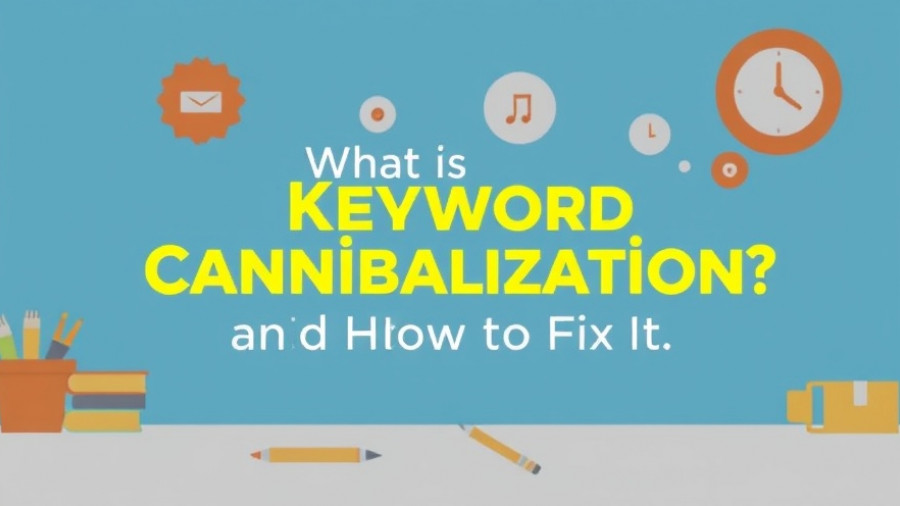
Understanding Seasonal Keyword Trends: An Essential SEO Strategy
In the fast-paced world of digital marketing, particularly in search engine optimization (SEO), recognizing and leveraging seasonal keyword trends can significantly enhance a brand's visibility and engagement. Seasonal keywords represent the fluctuations in search behaviors aligned with specific seasons, holidays, or events. For businesses operating in sectors such as e-commerce, fashion, travel, and holiday services, implementing a seasonal SEO strategy is not just beneficial; it is vital for capitalizing on peak consumer interest.
Historical Context: The Evolution of Seasonal SEO
When we look at how companies have adapted their marketing strategies over time, it becomes clear that seasonal keyword optimization has evolved alongside changing consumer behaviors. For instance, the rise of e-commerce and digital marketing analytics has allowed businesses to utilize tools like Google Trends and Google Search Console for insightful keyword research. This shift means brands can now predict consumer demands with greater accuracy, thus preparing relevant content ahead of peak seasons.
Why Seasonal Keywords Matter: The Consumer's Perspective
From a consumer standpoint, seasonal keywords play a crucial role in the shopping experience. They reflect immediate needs and desires, influencing when and how customers engage with brands. Companies like ski resorts cleverly use keywords such as “winter vacation” during the colder months and switch to “summer getaway” as the temperature rises. Understanding this shift allows brands to reach their target audiences effectively, tailoring their messaging accordingly to drive conversions.
Actionable Insights: Utilizing Seasonal Keyword Strategies
The implementation of seasonal marketing strategies can dramatically influence a company's revenue during peak times. Here are key practices to consider:
- Keyword Research Techniques: Use tools such as Semrush or Google Trends to identify trending seasonal keywords relevant to your business. Analyze past data to predict upcoming trends, such as traffic spikes during the holiday season for fashion retailers.
- Content Strategy Development: Create timely, relevant content that resonates with seasonal interests. For example, a garden supply store can develop blog posts around “spring planting tips” during early March, attracting organic traffic just in time.
- Landing Page Optimization: Tailor website pages specifically for seasonal searches. Harness insights from analytics to revamp existing pages, incorporating seasonal keywords to capture heightened search interests effectively.
Future Predictions: The Road Ahead for Seasonal Marketing
As technology continues to evolve, so too will the landscape of seasonal SEO. With the advent of AI and machine learning, future tools will likely offer even deeper insights into consumer behavior, making it possible for brands to anticipate trends more accurately. Expect more focus on personalized marketing tactics, as businesses aim to cater to individual preferences based on seasonal data.
Common Misconceptions: Debunking Seasonal SEO Myths
Despite the clear advantages of using seasonal keywords, many businesses shy away from implementing these tactics due to misconceptions. One prevalent myth is that seasonal SEO is only necessary for businesses driven by holidays or seasons, when in reality, any brand can leverage seasonal trends to enhance visibility and engagement throughout the year.
Challenges in Seasonal SEO: Navigating the Complexity
As companies dive into seasonal keyword optimization, they may encounter a few challenges, including increased competition during peak seasons and the need for more substantial budget allocations. However, with strategic planning and early implementation, these challenges can be overcome to ensure that brands maintain and even improve their search rankings.
In conclusion, understanding and harnessing seasonal keyword trends is essential for businesses aiming to stay relevant and competitive in the digital marketplace. Whether you're an e-commerce store, a local business, or a service provider, adapting your SEO strategies according to seasonal trends can lead to increased visibility, engagement, and ultimately, conversions. To embrace the benefits of seasonal SEO fully, start integrating these strategies into your overall marketing plan this year.
Ready to utilize seasonal SEO strategies to broaden your reach? Connect with digital marketing experts to enhance your campaigns and stay ahead of market trends.
 Add Row
Add Row  Add
Add 




Write A Comment